- Home
- Tamora Pierce
Daja's Book Page 6
Daja's Book Read online
Page 6
“I know what that one means,” retorted Tris.
“And kaqs,” finished Polyam. “I don’t need manners, only authority.”
Daja stared at Polyam, thinking she had been stupid to believe it would matter, to speak face-to-face with a Trader again. It was stupid to think her banishment from the world she had lived in most of her life would pinch less if she could pretend she was a Trader just for an hour or two.
She was about to tell Polyam to take the iron vine and keep her money when Sandry rose, smiling her loftiest young-noble smile, and shook out her skirts. She said, “Along with the manners you should use to another Trader—”
“Trangshi,” Polyam hissed.
Sandry ignored the interruption. “—you appear to have forgotten custom,” she continued. “I see none of those things that make it possible to bargain for such a priceless item. Where is the food, and the tea? I’m sure Daja will understand if there are no musicians, given our surroundings. If we were in Summersea, of course, you’d need at least a flutist and a gittern player.”
“Cushions,” Briar put in, interested. “You need proper cushions to sit on. And one of those little wood table things.”
Even Tris was smiling now. “A gift of some kind, as a mark of respect,” she added. “Back home in Capchen, the bigger the sale, the more important the token.”
Polyam looked at Daja. The black girl was just as surprised as the Trader, but she quickly hid it with a casual shrug. At that moment, Daja thought, she would cheerfully die for any of her three friends, who defended her without being asked.
“Sorry you got all done up in yellow for nothing,” commented Briar as Daja put more iron rods into the fire to heat.
“Come back when you are ready to do business,” Sandry told Polyam, looking down her small nose at the woman.
Someday I’ll have to get her to teach me that trick, Daja thought, watching the uncertainty in Polyam’s face. You wouldn’t think it possible, but she can go all noble in the wink of an eye.
Without a word, Polyam swung around and left the small courtyard.
Sandry frowned at Daja. “Don’t let them walk over you,” she ordered sternly. “You’re not one of them, so make your own status. If they push you around now, they’ll keep doing it, and making you feel bad.”
“And they’ll try to cheat you when they buy,” added Tris, who was a merchant’s daughter to the bone.
“If you don’t let us push you around, you oughtn’t let them,” Briar added, practicing a handstand. “We saw you for your own self before they ever did.”
Daja sighed. “I don’t know who confuses me more,” she told her friends at last. “You or them.”
“Nonsense,” retorted Tris, pumping the bellows gently, since she wasn’t supposed to use magic to bring air to the fire. “We make sense.”
“That’s what confuses me,” said Daja.
“Here,” Rosethorn said to a servant behind her. She entered the courtyard carrying a basket full of pointed, spiny-edged leaves. Behind her trooped castle servants burdened with various jars, bowls, knives, ladles, bundles, pots, and a portable stove. A pair of footmen brought up the rear with a long worktable.
Briar screwed up his face. “Awww, Rosethorn,” he whined.
The table was placed on a section of the courtyard paved with flagstones, and the other supplies dumped on it. A number of matching blue jars were taken from baskets and lined up: eight of them, all alike, sealed with wax and cord.
“Don’t ‘awww’ me,” Rosethorn said, placing the basket of leaves beside the table. “After yesterday I don’t want you near the crocuses, but you can still make yourself useful. Those jars—” she pointed to the blue containers “—contain the same aloe-and-oil mixture we make at home. I need you to start turning the liquid into burn salve. You have wax—” She patted a heap of paper-wrapped bricks. “Cheesecloth for straining the liquid, and pots for heating it to blend with the wax. Someone will come with containers for the finished salve in a moment.” She settled a lumpy bag with a long strap over her shoulder. “You know the proportions of wax to oil, or you ought to—”
“I know ’em,” Briar retorted, and sighed. “After we got rid of the pirates this summer, we did so much of this burn glop I dreamed about it.” His hands, giving the lie to his gloomy face, dull voice, and slumped shoulders, cracked the seals on the blue containers.
“Then amuse yourself with salve. Before you start, though, show Tris how to cut up aloe leaves. You’ll set a fresh batch to steep in oil while you’re at it.”
“Urda’s womb!” cried the boy. “How much do you want? Enough to drown in?”
Rosethorn’s eyes were sharp as they met his. “You heard what was said last night, I’m told.” Briar grinned sheepishly. “Then you know what I expect,” she continued, her mouth quivering with amusement. “Look at it this way—maybe if you go to all the trouble of making salve, there won’t be a fire. Now get to work.” With a salute, she left them. On her way through the arch, she passed a servant with a wheelbarrow full of jars.
“What if I don’t want to cut up aloe leaves?” Tris demanded softly.
Rosethorn’s voice came back through the arch. “Ask me if I care what you want.”
“Why?” grumbled Tris. She gave the bellows a gentle pump to keep Daja’s fire going at its present heat. “It’s not like I don’t know the answer.” Picking up a knife, she asked Briar, “How am I to do this?”
She had just started to cut pieces of emerald-green flesh from the heart of each leaf when Lark arrived. She carried a basket of her own under one arm and smooth wooden sticks in her free hand. Sandry hurried to take the basket.
“If you want to practice your magic, go ahead,” Lark told the other three young people. “We’ll be working here all day.” Everyone settled into their tasks with very little conversation.
The first interruption came from an outsider. “Dedicate Lark, surely this is not proper work for Lady Sandrilene.” Yarrun Firetamer stood in the archway, a thin, unfriendly smile on his lips. His damp-looking eyes were fixed on Sandry, who walked on her knees between three stakes she and Lark had driven into bare earth. As she passed from stake to stake, she unrolled a sturdy thread from a ball of silk yarn. First she wrapped it in a figure eight between the two stakes that were closest together. She then stretched it cleanly around the farthest stake. Back and forth she waddled with her skirts kilted up, grinding dirt into her knees. Her shoes and stockings lay discarded under Briar’s worktable.
“You’d be surprised at the work I do, Master Firetamer,” Sandry told him grimly.
“My dear, you are a fa Toren.” He stretched his lips even wider, baring discolored teeth. “You should be at fine needlework, not—weaving.”
Lark, who was sewing ties to both ends of a wide cloth band, looked at Yarrun. “You say it like it’s a dirty word, Master Firetamer. But if I’m not mistaken, that fine robe you wear is the product of weaving—as is every stitch you have on, but for your boots.”
Yarrun stroked his overrobe—blue, shimmering silk with multicolored embroideries at the hems—and stopped, as if Lark had tricked him into giving something away. His eyes slid away from her to settle on Briar and Tris. For a long moment he stared, his sallow cheeks turning a mottled red. Briar was straining chunks of aloe from oil. All of his attention was locked onto his task as he carefully poured one jar’s contents onto a piece of cheesecloth stretched over a pot.
Tris noticed Yarrun’s stare and glared at him.
“Something for you?” she demanded.
“That will make enough burn ointment for an army!” he snapped.
Briar put his jar down and wrapped the cheesecloth around lumps of aloe, squeezing out every bit of oil. Only when he’d finished did he look at the older man. “Dedicate Rosethorn thinks it might be needed.” His gray-green eyes sparkled with mischief. “Me, I’ve learned she’s nearly always right.”
“I am sure your experience is vast, boy—certainl
y I, with thirty years as a mage, and ten years’ study before that, cannot hope to equal it.” Yarrun’s voice shook with fury. “You—and your teacher!—are wasting your time!” He stalked out of the courtyard.
“People around here think well of themselves,” murmured Daja, striking off a nail.
“We’ll fix that,” remarked Briar.
“Rosethorn is perfectly capable of taking care of herself,” Lark reminded them. “Sandry, wait. You’re winding too tightly.” Going over to the girl, she explained how pulling too hard made the stakes on which Sandry wound her thread lean inward. Sandry nodded, then picked up a mallet and pounded the stakes into a straight line again. If Lark hadn’t caught her mistake, she would have finished with a weaving that was shorter on the top than at the bottom.
Daja went to the bellows and gave it a quick pump, watching as strands of fire streamed into the air. They twisted to form a straight trunk, then spread in branches to either side, just as the iron vine had the day before.
They called to her. Reaching almost to the bed of coals, she gripped a pinch of the blue heart-flame in her right thumb and forefinger. Steadily she pulled it up as if she drew thin wire. Starting about an inch above the branching section of fire, she began to weave the blue flame in and out between the orange stems. It was the kind of pattern that Sandry had woven hundreds of times over the summer, the kind of work Daja once used to make a wire net. Reaching the leftmost branch, she doubled back and wove in the other direction. Inside she felt steady and clear, as smooth as a glassy sea with no hint of a breeze to ruffle it. The fire made sense, handled this way. The blue mixed with the orange where they met, providing a small blue spot at every joining, like the heart of a candleflame.
To and fro Daja walked, drawing her blue fire-thread with her, passing it gently through the orange strands. At last she could go no further. She had reached the ends of the orange stems. While she might have pulled them even higher and woven more, she felt a little odd—light-headed, with hot, dry eyes. With her left index finger and thumb she pinched each loose end of fire into the horizontal blue thread until they formed a seamless blend. Unlike her fire grid of the day before, this was far more tightly woven, with gaps less than the width of her little finger between the fiery lengths. The square’s brightness dazzled her eyes. Feeling along its base, she encountered the main stem and pinched it off. The fire weaving came free in her hands.
The moment it was flat on her palms, she knew she’d have to put it down. It was much too hot, not to mention too bright. With a sigh of regret, she laid it on the fire.
The fire went out. The weaving blazed against coals gone dead.
“What did you do?” whispered Briar, awed. He, Lark, and the two other girls were peering around Daja.
She glared at him. “Why are you forever asking hard questions?”
He smiled. “Sooner or later you’ll have to be able to answer one.”
Daja shoved him, grinning.
Tris bent perilously close to the woven fire, her long nose just inches from it, her gray eyes squinted nearly shut. “Why did the fire go out?” she asked plaintively. Her eyes watered. “You put this thing on the fire, and it went out, but why? Magic in it?”
“Fire needs air to burn,” Niko said, walking over to the forge.
Yarrun was with him. Everyone made way for the two men, who inspected the bright square. “My guess is that your weaving—it is a weaving?” Niko looked at Daja, who nodded. “Your weaving appears to have blocked the air from reaching the coals.” He reached out to touch it, but got no closer than a foot. Wincing, he pulled his hand back. “How did this come about?”
“I don’t know,” whispered Daja, holding her fingers out over the square. Its heat pressed on her skin. “It’s just that lately it seems like the fire wants me to do things with it. It wants me to shape it. So I do what it wants.”
“And yet it’s not really fire in and of itself,” Niko pointed out. “It appears to burn, yet does so without needing fuel. I suspect it doesn’t even need air, unlike your fire.” He squinted at the weaving, and the four knew that he was examining Daja’s creation with his own power. “It appears to feed on magic, but without destroying it.”
Yarrun, who had been pale, was turning a mottled beet color. “This—this is the Great Square of King Zuhayar the Magnificent. The Great Square, but—it cannot be done in fire or in pure magic. Inks, metals, etched in glass … I have seen all of these, but …” He seemed to be fighting to breathe. “Where are your protective circles? Or runes? What magic can you work if there are no runes to confine the effects or to guide the power of the raising? Niklaren Goldeye, is this your teaching? Magic without direction, without the correct procedures—how can it even exist?”
Lark firmly steered Yarrun to a bench and sat him down. “Get hold of yourself,” she ordered, black eyes flashing. “And stop yelling. You don’t look at all well. When was the last time you saw a healer of any kind?”
“I don’t need a healer!” he cried. “I need explanations! This—this isn’t magic!” He pointed at the forge with a trembling hand. “I don’t know what it is, but even you Living Circle mages understand there is a proper way to do things, and a Great Square made in fire is not it!”
“Is he always this excitable?” Briar asked Niko, who continued to study Daja’s creation.
“He acts like magic’s all about rules,” added Daja, shooting a glare at Yarrun. Lark had wet down her pocket handkerchief and was putting it across the man’s forehead. Yarrun leaned against the wall behind him and closed his eyes. His chest continued to heave; they could see he was talking fast, but at least he had lowered his voice.
“That is the thing about magic,” said Niko, smoothing his thick mustache. “It means something different to everyone. The fire wants you to shape it, you say?”
Daja nodded.
“What’s this Great Square he’s talking about?” Tris wanted to know.
“It is a talisman,” said Niko. “One generally used to draw things like fortune, wisdom, and the like.”
“Goldeye! Are you teaching them by guess and the gods?” Yarrun demanded shrilly.
Niko turned. “Their magic follows no instructional guidelines, or any of the patterns described in The Encyclopedia of Wisdom,” he said tartly. “My instinct is that to ground them now in matters of runes, protective rites, and formulas would be to restrict the growth of their power.”
“Of course it will restrict them!” cried Yarrun, lunging to his feet. Lark’s handkerchief fell into the dirt. “Without order to their learning, how will they be tested? How evaluated, how licensed? How will they teach? Even the mages of the Living Circle meet proper requirements to be granted journeyman status, and then an initiate’s robe!”
Lark thrust Yarrun back down on the bench and put her own body squarely between him and his view of the young people and Niko. “Enough,” she told him firmly. Lowering her voice, she continued to talk to him.
“Don’t let him upset you,” Niko told the four softly. “He’s old and he’s frightened.”
“You’re as old as him, and you aren’t scared of us,” Briar pointed out.
Niko glared at him. “Thank you oh so much,” he retorted waspishly.
“It’s not like I mean anything by it,” protested Briar. “Nothing bad, anyway.”
Lurching to his feet, Yarrun pushed Lark out of his way and stomped over to Niko. “I’m beginning to think those tales I heard of the last few months at Summersea are true!”“ he cried. “If these four young people are running wild, I’m not in the least surprised to hear they caused an earthquake!”
“That’s not true!” cried San dry, clenching her hands into fists.
Yarrun scowled at her. “I doubt that you caused a true earthquake—not four children,” he said with awful emphasis. “Credulous people have plainly blown the entire story out of proportion as it traveled north. But certainly you appear to be running amok—”
Niko swept past Y
arrun, one lean arm snaking around the other man’s shoulders. “I had no idea that the tales that reached Gold Ridge were so dramatic,” he said, talking calmly as he forced Yarrun to keep up with him. “Let’s find someplace quiet, and I’ll give you the facts of the matter.”
Lark was cross for one of the few times that her charges could remember. “Ignore him,” she told them firmly, once Niko had led him away. “He thinks the whole world should be ordered as he expects it. Thank heavens Niko got away from the university before they made him into someone like that.”
Everyone got back to work without much talk—Yarrun had unsettled them all. Finding that her grid worked as well as a fire to heat her rods, Daja continued to use it: for one thing, it didn’t add more smoke to the haze-filled air. Briar finished straining aloe from oil and began to heat the oil and wax to blend them. Tris worked through the basket of aloe leaves, cutting out the moist centers. Sandry finished winding her thread onto the stakes. She and Lark had just transferred the threads to the various long sticks that would serve her as a portable loom when the castle servants brought their midday meal.
5
The midday they got was very different from the sumptuous meal of the night before: hard cheese, cold sausages, bread, and buttermilk. “There’s no good complaining to me,” the manservant who brought it announced, though no one had said a word. “It’s the same fare we all have, though her ladyship would dine better, if she joined my lady and the other gentry in the lesser dining hall.”
Sandry shook her head and smiled. “I’ll eat with my friends, thank you. Tell her ladyship you couldn’t find me, if she asks.”
A hint of a smile twitched the man’s lips. He bowed to Sandry and left them all to their meal.
“I hate buttermilk,” complained Tris once they were alone. “And the water here tastes awful.”
“The bread is stale,” added Daja.
“Drought fare,” Lark said. “They need to save all they can for the winter. Things will be worse come spring, if they don’t get help from outside.”

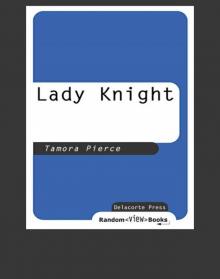 Lady Knight
Lady Knight Street Magic
Street Magic Bloodhound
Bloodhound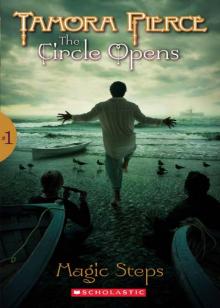 Magic Steps
Magic Steps Alanna: The First Adventure
Alanna: The First Adventure Emperor Mage
Emperor Mage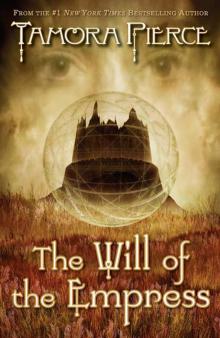 The Will of the Empress
The Will of the Empress The Realms of the Gods
The Realms of the Gods In the Hand of the Goddess
In the Hand of the Goddess Tris's Book
Tris's Book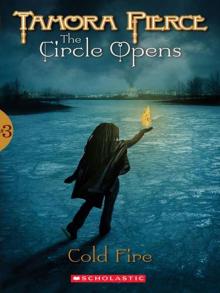 Cold Fire
Cold Fire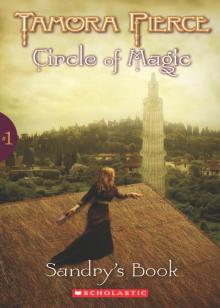 Sandry's Book
Sandry's Book Wild Magic
Wild Magic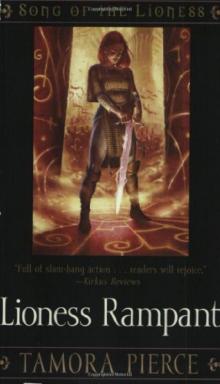 Lioness Rampant
Lioness Rampant The Woman Who Rides Like a Man
The Woman Who Rides Like a Man First Test
First Test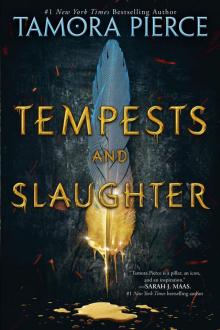 Tempests and Slaughter
Tempests and Slaughter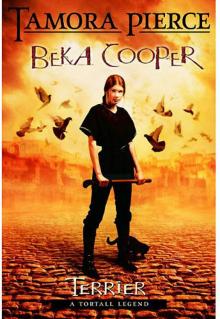 Terrier
Terrier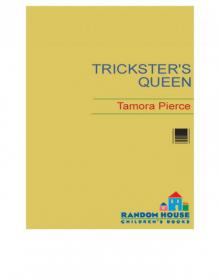 Trickster's Queen
Trickster's Queen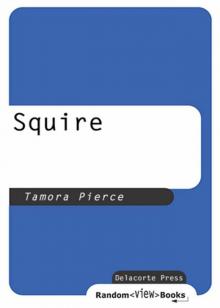 Squire
Squire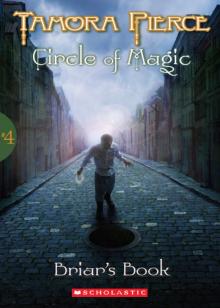 Briar's Book
Briar's Book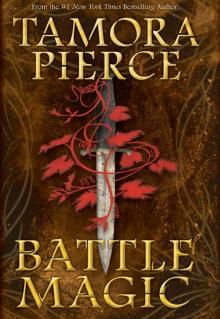 Battle Magic
Battle Magic Page
Page Melting Stones
Melting Stones Wolf-Speaker
Wolf-Speaker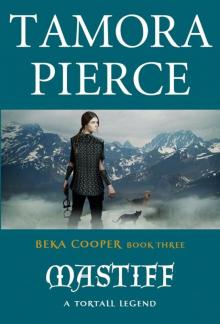 Mastiff
Mastiff The Song Of The Lioness Quartet #1 - Alanna - The First Adventure
The Song Of The Lioness Quartet #1 - Alanna - The First Adventure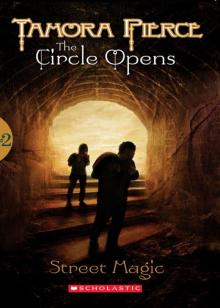 The Circle Opens #2: Street Magic: Street Magic - Reissue
The Circle Opens #2: Street Magic: Street Magic - Reissue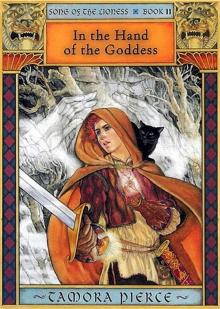 Tortall 1 - Song Of The Lioness #2 - In The Hand of the Goddess
Tortall 1 - Song Of The Lioness #2 - In The Hand of the Goddess Protector of the Small Quartet
Protector of the Small Quartet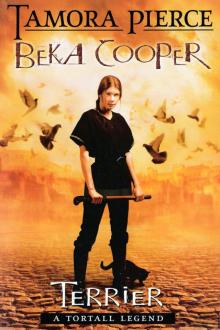 Beka Cooper 1 - Terrier
Beka Cooper 1 - Terrier Alanna
Alanna Trickster's Choice
Trickster's Choice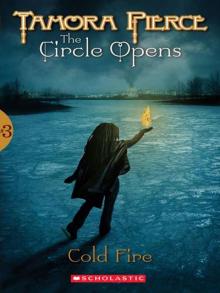 Circle Opens #03: Cold Fire
Circle Opens #03: Cold Fire In the Hand of the Goddess (The Song of the Lioness)
In the Hand of the Goddess (The Song of the Lioness)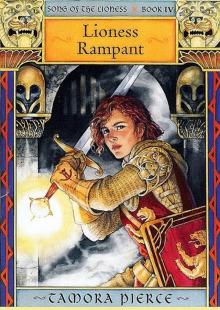 Song of the Lioness #4 - Lioness Rampant
Song of the Lioness #4 - Lioness Rampant Young Warriors
Young Warriors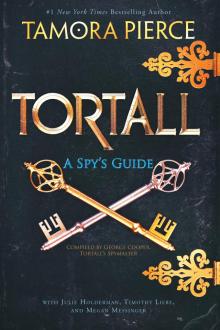 Tortall
Tortall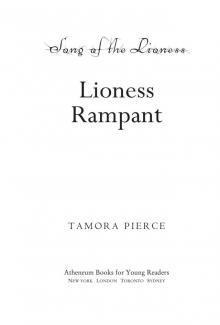 Lioness Rampant (Song of the Lioness)
Lioness Rampant (Song of the Lioness) Melting Stones (Circle Reforged)
Melting Stones (Circle Reforged) The Circle Opens #4: Shatterglass
The Circle Opens #4: Shatterglass